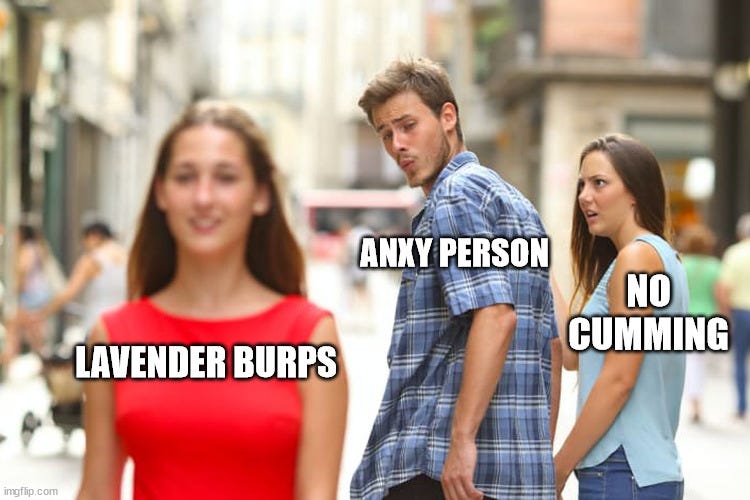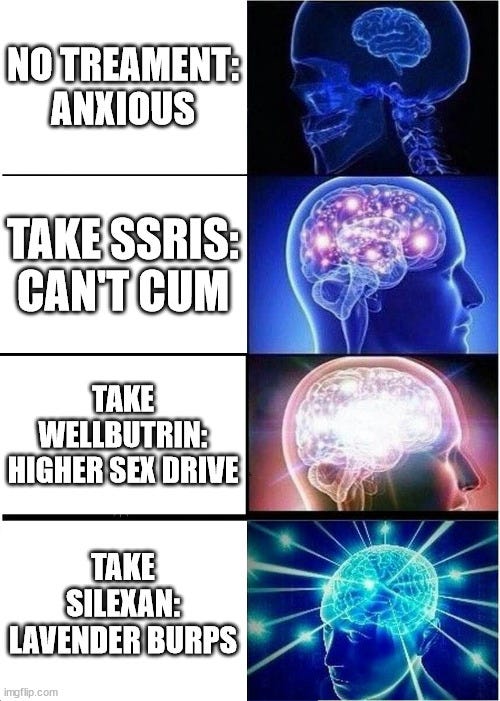This post is under my ‘Showing My Workings’ section: Extra bits and pieces that don't feel complete or meaty enough to post to main newsletter.
Continuing my mental health treatment philosophy of “Keep throwing different potentially promising shit at the wall until something sticks (and then get demoralised or overwhelmed and stop trying things for a while and then read a cool blog post about something interesting and start trying things again)”, I just started taking Silexan ( which is just lavender oil prepared in a particular standardised way) for anxiety. I’m planning to try it for 3 weeks and see what happens.
I read about it on Thursday in Scott Alexander’s new post:
I’ve linked to Scott’s blog posts many times on this blog, I’m a big fan, and his day job happens to be being a psychiatrist. In that post he describes how the studies so far on Silexan show strong effects on anxiety — better than SSRIs, which are a current frontline medication for anxiety. (I tried SSRIs last year but they didn’t work for me. That doesn’t mean you shouldn’t try them though if you haven’t, they have very different effects for different people). Scott says that a “very reputable professional publication within psychiatry” (his words, I trust him) , The Carlat Report, has recently published positively about Silexan, saying
Most [alternative medicine] therapies do not have robust effects, but Silexan is an exception. Consider it in adults with generalized anxiety disorder.
But Scott notes that it’s early days because only six studies have been done so far and all but one of them have been run by the same researcher. Often in psychiatry (and many other fields), the initial studies on something show larger effect sizes than what is later bourne out by further research1. Also, in this case all the studies have had some kind of funding conflict of interest with the company producing Silexan. Scott doesn’t think this is a reason to fully write off the studies though, because:
You might think I’m trying to write a hit job on silexan, but not really. The fact is, this is par for the course in the supplement world, and only a little unusual for any mental health treatment. Studies are expensive, and the natural funder (until big government agencies get involved) is the company marketing the drug. Usually there will only be one academic institution or team that’s really committed, and if it has a prestigious leader, his name will be on all of the papers.
Professor Kasper seems like as legitimate and respectable a researcher as you can get for these kinds of things: head of the Department of Psychiatry at the University of Vienna, chair of the World Psychiatric Association’s pharmacology branch, editor of three good journals, various important and influential papers. Sure, he’s gotten “grants/research support, consulting fees and/or honoraria” from Schwabe. But he’s also gotten money from “Angelini, AOP Orphan Pharmaceuticals AG, AstraZeneca, Eli Lilly, Janssen, KRKA-Pharma, Lundbeck, Neuraxpharm, Pfizer, Pierre Fabre . . . and Servier”, and you don’t see him writing nearly as many glowing papers about their drugs. High-level academic psychiatrists academics are usually working with a bunch of drug companies and getting paid for that work, and this isn’t usually considered disqualifying to their credibility.
Scott also notes that when you look at the details of the studies they’re unusually well-run (large sample sizes etc), and in addition there’s a bunch of supporting circumstantial evidence suggesting Silexan’s effectiveness (e.g. animal studies, anecdotal evidence from doctor’s who’ve used it with their patients). So at this point it looks very promising, but to get more confidence in whether it works and how well, we’ll have to wait for further studies from other researchers and see what effect sizes they show. Taking all this into account, Scott predicts a
50% chance personal prediction that, when independent studies are done, silexan will have an effect size equal to or greater than SSRIs for anxiety (ie 0.3)
(“Effect size” measures how much of an effect the medication in a study had on reducing anxiety, on average).
And a Scott-estimated 50% chance of that was more than enough for me to pop in to the chemist on Thursday and grab a box of 56 capsules off the shelf (no prescription!) for 30 bucks to test for myself whether it works for me (No this is not a sponsored post lol). Especially because it’s not addictive and has no major side effects — in fact one of the only side effects listed is what has got to be the cutest side effect I’ve ever seen listed for any medication: Burps that smell like lavender.
I plan to post an update in three weeks about my experience with it and whether I decide to keep taking it or not!
I’ve picked up the sense that this is like ‘common knowledge’ amongst researchers, but here’s an actual study on this tendency as well: Aran Tajika et al., ‘Replication and Contradiction of Highly Cited Research Papers in Psychiatry: 10-Year Follow-Up’, The British Journal of Psychiatry 207, no. 4 (October 2015): 357–62, https://doi.org/10.1192/bjp.bp.113.143701









